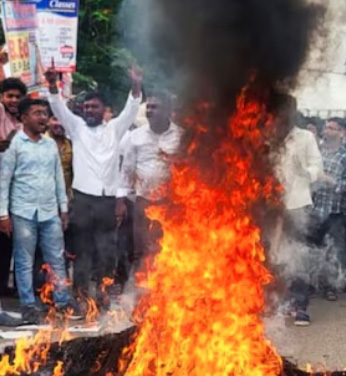Bhubaneswar: The recent series of self-immolation cases by young women in Odisha is a tragic and complex issue, stemming from a combination of systemic failures and societal pressures. These incidents aren’t random acts but rather desperate cries for justice in a system that, for various reasons, has failed them.
The first involved a 20-year-old college student in Balasore who set herself on fire on campus after her repeated complaints of sexual harassment against a professor were allegedly ignored by the college administration. Her death, after a two-day battle for life, sparked outrage and led to the arrest of the principal and professor.
The second case, in Puri, involved a minor girl who died from burn injuries after her family claimed she was set on fire by miscreants, though police are also investigating the possibility of self-immolation.
In the third incident, a 20-year-old college student in Kendrapara died by self-immolation, with her family alleging that police had refused to register an FIR months earlier against her ex-boyfriend who was blackmailing her with private photos.
Fourth case on Monday morning, a 13-year-old girl in Bargarh, Odisha, attempted self-immolation, becoming another tragic case in a disturbing trend. The girl, a Class 8 student, reportedly set herself on fire in a field near her maternal uncle’s house.
She was found in a critical state by villagers who managed to douse the flames and rush her to a hospital. She has passed away in the meantime.
While the exact reason behind her suicide is still under investigation, the incident adds to the growing list of such cases in Odisha in recent weeks.
A primary cause is the systemic failure to protect women from sexual harassment and blackmail. In one case, a college student set herself on fire after her complaints of sexual harassment against a professor were allegedly ignored by the college’s Internal Complaints Committee (ICC).
The victim’s family claimed the administration and authorities failed to act on the complaint and instead subjected her to further humiliation. This highlights a critical issue: the mechanisms meant to protect women, such as ICCs, are often dysfunctional or lack the authority to enforce consequences, leaving victims feeling helpless and unheard.
Odisha Government has recently responded by launching a program called “Shaktishree” to ensure the safety of female students in colleges and universities. The program includes the establishment of an online complaint system for students to escalate issues if they feel their complaints aren’t being addressed by the ICC. It also mandates a code of conduct and training for staff on gender sensitivity. While a positive step, it’s a reactive measure in the wake of tragedy, pointing to the prior failure of existing safeguards.
Another significant factor is the alleged inaction and negligence of the police. In a separate case, a 20-year-old student died by self-immolation after her ex-boyfriend threatened to leak private photos and videos. Her father alleged that when they tried to file a complaint six months prior, the police refused to register an FIR and simply advised them to block the boy’s number. This demonstrates a serious lack of sensitivity and proper training in handling such cases. The police’s dismissal of the complaint not only failed to protect the victim but also emboldened the harasser.
While police have since made arrests and transferred the officers allegedly involved in some of these cases, the initial response highlights a significant flaw. The lack of prompt and decisive action from law enforcement leaves victims with no faith in the police system, making them feel that their only recourse is an extreme act of protest against the injustice.
The role of social media and the fear of public shame also contribute to these tragedies. In several cases, blackmail involving the threat of leaking private photos or videos was a key factor. In a deeply patriarchal society, the fear of public humiliation and “dishonor” can be overwhelming. Victims are often trapped between the threat of social ostracism and the lack of institutional support, leading to a sense of absolute despair. The self-immolation in these cases becomes a final, desperate act to reclaim control and make a powerful statement about the injustice they faced.
These incidents underscore a pressing need for a more robust, responsive, and empathetic support system for women and girls in Odisha. It requires not only stronger laws but also a fundamental change in how institutions, law enforcement, and society at large address harassment, blackmail, and violence against women.


